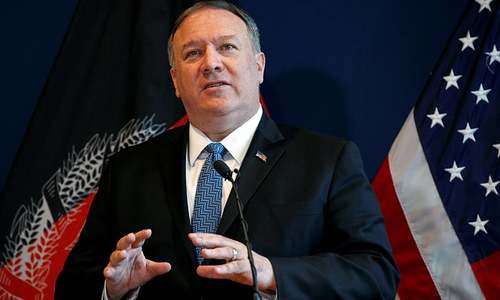KABUL: US Secretary of State Mike Pompeo said on Tuesday he hopes for a peace deal with the Taliban “before September 1”, speaking as he made his first visit to Kabul since Washington launched talks with the insurgents last year.
Pompeo met President Ashraf Ghani as well as General Scott Miller, who leads Nato’s Afghanistan mission and the US war effort in the country, as well as other high-level Afghan officials during the unannounced one-day visit to the Afghan capital.
He said peace was Washington’s “highest priority”. Last September the US began a fresh push to bring the Taliban to the negotiating table to end America’s longest war.
“I hope we have a peace deal before September 1, that’s certainly our mission set,” Pompeo said during the visit.
US officials have previously said they are hoping for a deal before the upcoming Afghan presidential elections, which have already been delayed twice and are now set for September.
The next round of talks between the Taliban and the US are set to begin on June 29 in Doha.
The talks have centred on four issues: counter-terrorism, the foreign troop presence, an intra-Afghan dialogue, and a permanent ceasefire.
The Taliban have insisted that foreign troops must leave, and refused to speak to the Afghan government in Kabul, whom they deem “puppets”.
Pompeo said the US is nearly ready to conclude a “draft text” outlining Taliban promises never to allow Afghanistan to be used as a base for international terrorism again.
“In light of this progress we’ve begun discussions with the Taliban regarding foreign military presence which today remains conditions-based,” he said.
“And while we’ve made clear to the Taliban that we’re prepared to remove our forces, I want to be clear we’ve not yet agreed on a timeline to do so.”
Huge swathes of Afghan society worry that if the US does make a deal with the Taliban, the militant Islamists would try to seize power and undo advances in women’s rights, media freedoms, and legal protections.
Pompeo’s visit also came amid an escalating regional standoff with neighbouring Iran, as Washington announced sanctions against supreme leader Ayatollah Ali Khamenei and US President Donald Trump warned of “overwhelming” retaliation to any attack.
Analysts have warned war with Tehran could have a devastating impact on Washington’s efforts to secure a peace deal in Afghanistan.
Iran and Afghanistan share a 900 kilometre border and have long had a complex relationship.
Iran nearly went to war with the Taliban regime in 1998, and quietly backed the US invasion of 2001.
But Tehran has more recently sought to build relations with the Taliban, mindful of preserving interests in the neighbouring country.
US officials have accused Iran of providing material support, including anti-tank guided missiles and other weaponry, to the Taliban since at least 2007.
Published in Dawn, June 26th, 2019














































